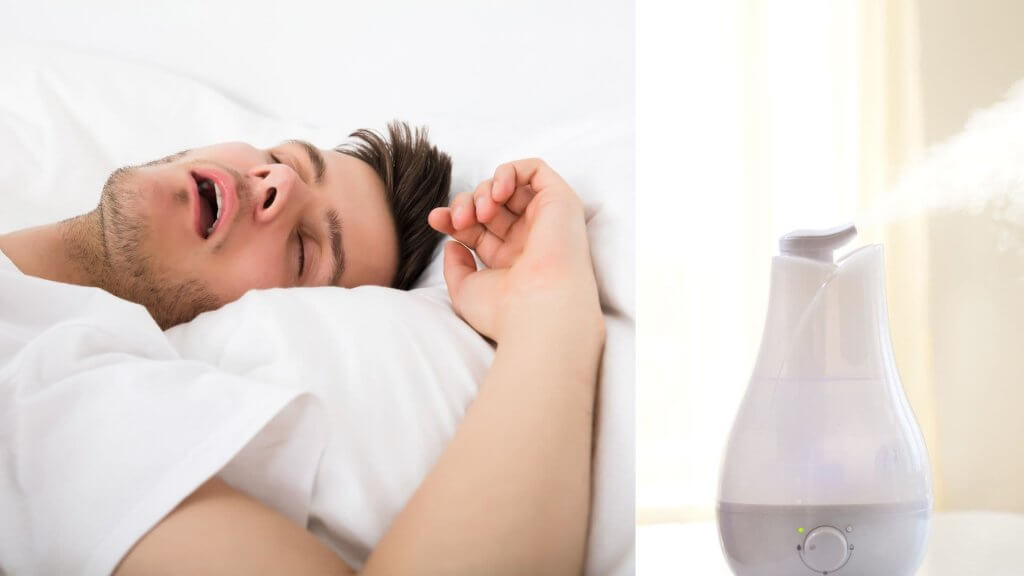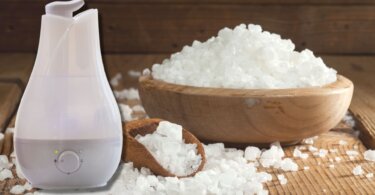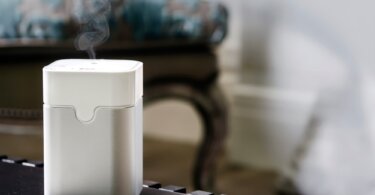When you have a snoring problem, you may try various things to keep it under control or to avoid it. For instance, you may change your lifestyle and diet.
You may also use nasal strips to control your airways so that the upper tissues will not vibrate during breathing. Another option that some people may try is to place a humidifier in the room. But do humidifiers help with snoring?
Using a humidifier in your bedroom can help in increasing the humidity levels and can reduce snoring in some circumstances. Let’s find out how and why.
- What Causes People to Snore?
- How Do Humidity Levels Affect Snoring?
- How Can I Measure the Moisture Level in Your Room?
- Does a Humidifier Help With Snoring?
- How Long Will a Humidifier Take to Decrease Snoring?
- Humidifiers Can Provide You Relief But Not Completely Cure Snoring
- Frequently Asked Questions
- Wrapping Up

What Causes People to Snore?
When you start dozing off and move from light sleep to deep sleep, the muscle segments in your throat start narrowing. If the airways become too narrow, then the upper tissues start vibrating when you breathe, and this can cause the snoring sound.
Snoring can also be a consequence if you continuously breathe in dry air. Dry air can make it hard to breathe properly and can create a snoring sound.
If you have allergies and colds, these can also cause you to snore while sleeping.
Snoring can create problems for others too! Snoring near someone who is sleeping can wake them up in the middle of the night. This can ruin their night, and improper sleep can cause stress and frustration. Your partner will be less able to concentrate during the day.
How Do Humidity Levels Affect Snoring?
When the air in a room becomes dry, it can dry up the tissues in the throat and nasal area. This causes a restriction in the airflow during breathing and makes the upper tissues of the throat vibrate, which causes the snoring sound.
How Can I Measure the Moisture Level in Your Room?
You can test the moisture level in your room with an instrument called a hygrometer, which is a device that measures the moisture in the air.
The relative humidity is the amount of moisture the air contains divided by the maximum amount of moisture that the air can hold. If the relative humidity is low in your room, then the moisture present in the air is low, which can cause skin irritation, dry eyes, coughing, blurred vision, and even snoring.
The ideal relative humidity should be between 30-50 percent. If it is below 30 percent, then you may start to snore while sleeping.
Does a Humidifier Help With Snoring?
Yes, a humidifier can help with your snoring.
A humidifier can help to maintain the relative humidity level in the air. A humidifier is a machine that sprays water droplets and increases the moisture in the air.
Humidifiers are available in various types. You may opt for a portable humidifier, which is easier to transport from one place to another and is available at a low price.
Related article: What Is The Difference Between a Vaporizer and a Warm-Mist Humidifier?
You should choose the low-power humidifier if your bedroom is small. If you have a big bedroom, then select a high-power humidifier. Another thing to look for is to buy humidifiers that make less noise while running so that you can have a good night’s sleep.
A humidifier can help against snoring in two ways: increasing the moisture in the environment and cleaning impure air.
Increasing Moisture
The cells and tissues in your throat and nose become irritated when the air becomes dry. If there is insufficient moisture in the air to soothe your airways, you can begin developing either throat problems or start snoring.
Dry air can also narrow your airways, which can cause difficulty for you to breathe. A humidifier can increase the moisture level in your room. However, if you are living in high humidity areas and start using a humidifier, then your device will not be useful.
Cleaning the Air
Various allergens may float in the air, and some individuals may have allergies to them. Your allergies can also cause snoring. A humidifier creates a damp airflow and these tiny droplets catch dust particles or allergens. As a result, you will breathe in cleaner air, decreasing the snoring sound.
How Long Will a Humidifier Take to Decrease Snoring?
If you think that using a humidifier will give you instant relief from snoring, you are mistaken. It will take time to decrease your snoring.
A humidifier helps release moisture into the air so that your throat will not irritate and you can breathe properly. It will even reduce the vibration of upper tissues in the airways, which will eventually cause a reduction in your snoring.
Also, check out our article about How to Prevent Mold in a Humidifier.
Humidifiers Can Provide You Relief But Not Completely Cure Snoring
When you add a humidifier to your room, then it will surely provide you relief and reduce your snoring, but it will not treat the root cause of snoring.
If you find that a humidifier is insufficient to cure your snoring, then it is better to consult with your doctor. You can snore due to numerous factors, like smoking cigarettes, obesity, poor health, respiratory diseases, allergies, weaker muscle tissue, or aging. Your doctor will detect the underlying cause and advice you about treatments accordingly.
Frequently Asked Questions
1. Is warm mist or cool mist better for snoring?
There are mainly two types of humidifiers: cool mist humidifiers and warm mist humidifiers. A cool mist humidifier increases the moisture level in your room by using cold water, while a warm mist humidifier boils the water so that it can release steam into the air inside your room. Both humidifiers are equally good at reducing snoring.
Related articles:
What is the best water for a humidifier?
What Is The Difference Between a Vaporizer and a Warm-Mist Humidifier?
2. What home remedy is good for snoring?
- You should sleep on one side.
- You should sleep for at least 8-9 hours a day.
- Avoid smoking and alcohol as much as possible.
- You can use nasal strips.
- You should maintain a moderate weight.
- You should use a pillow that best supports your head and neck in a horizontal position when sleeping on your side.
- You should avoid taking any sedatives before going to bed.
3. Is a humidifier or dehumidifier better for snoring?
If the air in your room has more than 60 percent relative humidity, you need to use a dehumidifier. The dehumidifier will help in cleaning and purifying the air and help in reducing snoring.
But if the relative humidity in your room is below 30 percent, then you should use a dehumidifier to increase moisture in your air.
4. Can a humidifier help sleep apnea?
Yes, CPAP humidifiers can help to maintain humidity and warmth in the air and infuse moisture into it. They are typically considered a good way to reduce sleep apnea symptoms.
Wrapping Up
If you are looking for a solution to snoring, then a humidifier can be a good option only if the root cause is dry air. You should keep in mind that the cause of snoring can be different from one person to another.
A humidifier that will work effectively in one person may not be effective for another person. So, we advise you to explore solutions with your doctor if you find the humidifier is not effective in your case.
Thank you for reading this article. We hope we have answered questions related to snoring and how humidifiers can help.
Make sure you check out my selection of the Best Humidifiers for Hard Water.
Related articles: What Should I Set My Humidifier To? and Humidifiers For Singers: Vocal Chords Benefits.





Leave a Comment